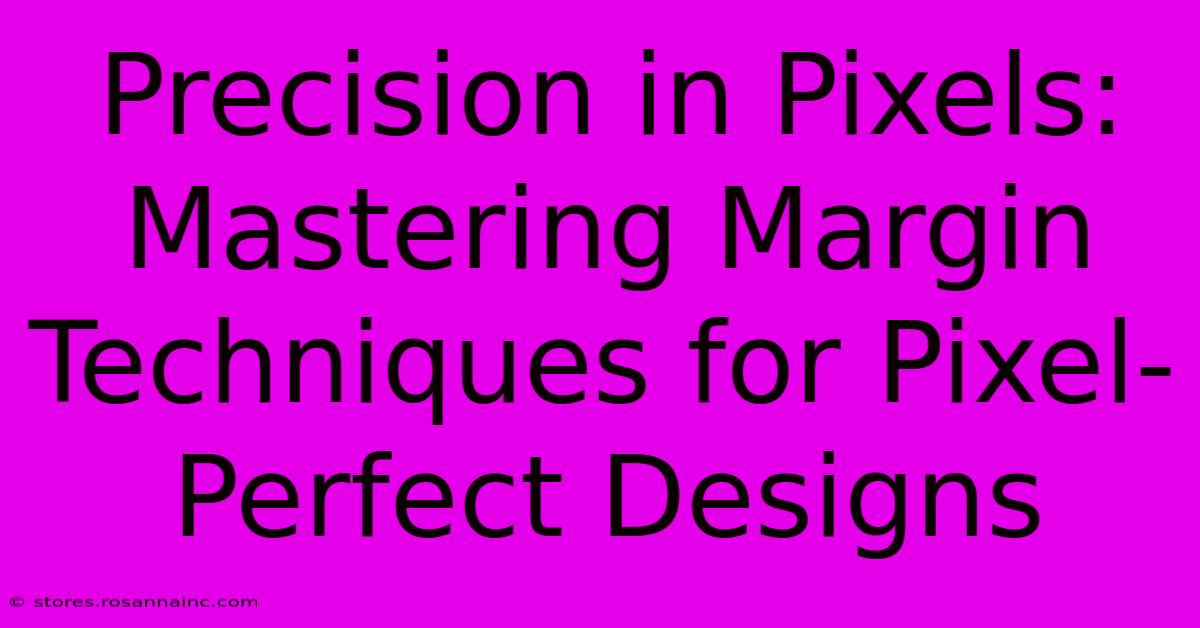Precision In Pixels: Mastering Margin Techniques For Pixel-Perfect Designs

Table of Contents
Precision in Pixels: Mastering Margin Techniques for Pixel-Perfect Designs
Achieving pixel-perfect designs is the holy grail for many designers. It's that satisfying feeling of absolute control, where every element sits exactly where it should, creating a clean, professional, and polished look. While many aspects contribute to pixel perfection, mastering margin techniques is paramount. This article delves into the nuances of margins and how to utilize them for precise and flawless designs.
Understanding Margins: The Foundation of Spacing
Margins define the space outside an element. They're crucial for creating visual hierarchy, breathing room between elements, and ultimately, that pixel-perfect alignment. Confusing margins with padding? Padding refers to the space inside an element, affecting the content within. Understanding this fundamental difference is key.
Types of Margins
- Top Margin: The space above an element.
- Right Margin: The space to the right of an element.
- Bottom Margin: The space below an element.
- Left Margin: The space to the left of an element.
These margins can be individually adjusted for granular control. Many design tools allow you to input precise pixel values for each margin, offering unparalleled precision.
Mastering Margin Techniques for Pixel Perfection
Pixel-perfect designs demand accuracy. Here are some essential techniques for mastering margins:
1. Embrace the Power of Precise Pixel Values
Forget arbitrary percentages or relative units (unless intentionally used for responsiveness). When striving for pixel perfection, specify your margins in exact pixel values. This gives you absolute control over spacing, preventing unexpected fractional pixel shifts that can ruin your carefully crafted layout.
2. Leverage Margin Collapse
Understanding margin collapse is vital. When two adjacent elements have margins, the larger margin often takes precedence, collapsing the space between them. This can be both a blessing and a curse. Learn to use this to your advantage for simplifying your CSS and creating consistent spacing, or prevent it with appropriate techniques like using padding or border.
3. Utilize Auto Margins for Centering
Centering elements horizontally is straightforward using margin: 0 auto;. This is a simple yet powerful technique for quickly aligning elements to the center of their container. This works best when the element has a defined width.
4. The Importance of Consistent Spacing
Consistency is king. Establishing a consistent baseline for margins throughout your design— perhaps using a base grid system— creates a visually harmonious and professional aesthetic. This ensures a unified look and feel and avoids a chaotic jumble of inconsistent spacing.
5. Browser Developer Tools: Your Best Friend
Your browser's developer tools are invaluable for inspecting and adjusting margins. Use them to meticulously examine the rendered pixels, identifying and correcting any inconsistencies or unexpected behavior. This iterative process is crucial for achieving pixel-perfect accuracy.
6. Responsive Design Considerations
While pixel precision is important, remember to balance it with responsive design principles. For adaptable layouts, consider using media queries to adjust margins based on screen size. This ensures your design remains clean and functional across different devices.
Beyond Margins: Other Factors in Pixel Perfection
While margins are critical, remember that achieving pixel-perfect designs involves more than just margins. Other factors to consider include:
- Font Metrics: Understanding font metrics (ascent, descent, line-height) is crucial for precise vertical alignment of text.
- Image Optimization: Using correctly sized and optimized images prevents unwanted pixelation and blurriness.
- Border Handling: Border widths can impact overall element dimensions, so account for them when determining margin values.
Conclusion: The Pursuit of Pixel Perfection
Mastering margin techniques is a vital step towards achieving pixel-perfect designs. By embracing precise pixel values, understanding margin collapse, and utilizing browser developer tools, you can create clean, polished, and professional interfaces that leave a lasting impression. Remember that consistency and attention to detail are paramount in the pursuit of this design ideal. The results are worth the effort!

Thank you for visiting our website wich cover about Precision In Pixels: Mastering Margin Techniques For Pixel-Perfect Designs. We hope the information provided has been useful to you. Feel free to contact us if you have any questions or need further assistance. See you next time and dont miss to bookmark.
Featured Posts
-
Unveiling The Midas Touch The Outrageous Payouts Of Nil College Athletes
Feb 05, 2025
-
Crazy Train Get Ready For The Wild Ride Of 1970s Men In Shorts
Feb 05, 2025
-
Unleash The Beasts Epic Fantasy Basketball Names To Dominate Your League
Feb 05, 2025
-
The Truth Revealed Uncovering The Hidden Power Of Light Blood Hexes
Feb 05, 2025
-
Unlock The Past Enhance The Present Vintage Kitchen Appliances That Wow
Feb 05, 2025
